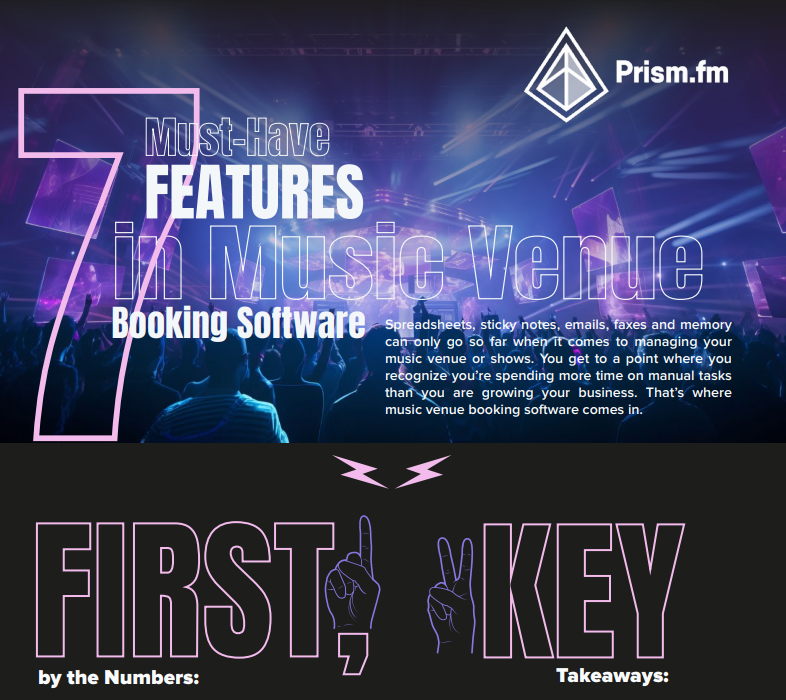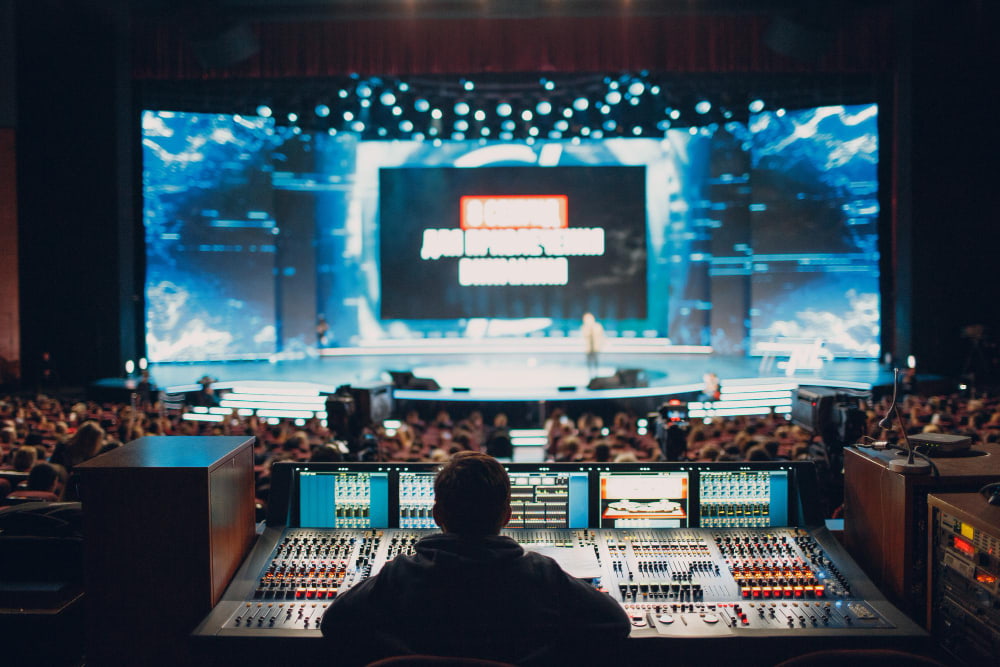
Expert Tips: How to Choose The Right Music Venue Booking Software
How is your music venue currently handling the booking process? Some venues still use an old-fashioned approach involving handwritten notes, paper calendars, spreadsheets, and a lot of luck. While those tried-and-true methods might have worked in a bygone era, today’s music industry is more complicated and requires a more sophisticated approach to daily operations. Modern music professionals are embracing the digital frontier, first digitizing their tickets and now looking for ways to streamline their booking systems.
It’s time to put the pen and paper away and embrace purpose-built software for the live music industry. In other words, it’s time to find the right music venue booking software for your stage.
Whether you’re a music venue owner or artist promoter, booking software can help optimize your operations, manage shows more efficiently, and increase your business’s productivity. To find the best digital booking platform for your music venue, learn more about what the software can do and the top essential features to look for.
What is Music Venue Booking Software?
Music venue booking software gives artists, managers, and promoters a central platform to manage all the moving parts of running a music business. From calendars to contracts, settlements to sign-offs, users can stay on the same page regarding upcoming dates, responsibilities, to-do lists, and more. When operating without the right music venue booking software, venues can become disorganized and prone to error, leading to miscommunication, missed opportunities, and missed revenue.
The best music venue software consolidates all of your tools, processes, and responsibilities into one platform and enables you to share music-essential data with anyone on your team. Handle everything from coordinating suitable dates on shared calendars to settling the final payouts among artists. A digital booking platform can make collaborating and sharing information easier for everyone in your network.

7 Must-Have Features of the Right Music Venue Booking Software
Ready to supercharge the efficiency of your music venue and go digital? Here are the top features to look for when searching for booking software and some expert tips on making the most of your new tool.
Feature #1: Start-to-Finish Booking Management
Venue booking management is complex. Anyone in the business understands that effective booking involves much more than putting a name on a calendar. Successful venue booking involves a lot of people, moving dates and schedules, crucial contracts, and financial negotiations. Doing all that work manually is enough to send anyone’s head spinning.
Related: Say Goodbye to Spreadsheets: How Live Music Management Software is Changing the Game
The right venue booking software can help you organize and manage all those moving parts. From hold to offer to settlement, effective venue software should give you a central platform to manage all aspects of booking management while helping you eliminate costly redundancies and improving your team’s communication.
Look for software that offers comprehensive features for venue booking management, from calendars to payments and final reporting.
Feature #2: Lots of Customization Options
No out-of-the-box software package will be exactly what you need from the start. But great software can adapt to your venue’s workflow and become a custom-fit solution with its customizable options.
Look for options that let you precisely manage important aspects, such as how you communicate with your team, when you send out reminders, or how you navigate your calendar. It’s even better if you can incorporate your venue’s branding into reporting, emails, advances, and more.
Feature #3: Comprehensive Integration Capabilities
Most music professionals have embraced the digital landscape, so music venue booking software probably won’t be the only tool in your tech stack. It’s great if your chosen software plays nicely with the other apps and platforms you use. That might include integrating with your team’s Google calendar, linking communications to your work email, and quickly grabbing data from your preferred ticketing source.
These tech integrations make it a lot easier to share information among your team and other platforms you use, which helps sync data in real-time to create a single source of truth. You can eliminate a lot of manual data entry this way and save time for more significant projects (or, dare we say it, even taking a fifteen-minute break for once).
Feature #4: On-the-Go and Mobile Accessibility
It’s rare to meet a music venue manager who works exclusively from their office. Many music professionals are taking calls from producers, artists, and promotions teams at all hours of the day (and sometimes the night). They’re often on the go, working from their phones while they grab lunch, scout talent, or pick the kids up from school. Only modern music venue booking software can keep up with such busy schedules.
Look for mobile-friendly software so you can access information from wherever the industry takes you. Succeeding in the music world is all about agility and being able to pivot at the right moment. Cloud-based platforms should make it easy to log in from anywhere, so you can focus on building important relationships while having all your professional tools at your fingertips.
Feature #5: Robust Reporting and Analytics Info
Your involvement in a show doesn’t end at the encore. A lot of the most important work happens after the show, with the reporting and analytics. It’s critical to know the final numbers for payouts, understand how effective your marketing was, and learn from a single show how to improve all upcoming ones.
The right music venue software can give you insight into these aspects of management and so much more. Look for software that offers plenty of reporting and analytics features so you can pull data about shows and make informed decisions for future optimization opportunities.
Feature #6: Easy Management of Permissions and Access Control
Your music venue probably isn’t a one-person operation. You have event staff, promotions teams, concessions managers, maintenance staff, and other experts who also need the latest details on what’s happening and when. But not all of these people require the same level of access to information, and there are some aspects that should be kept between a select few.
Look for booking software that allows you to control who has access to what information. Permissions and access control should be easy to tweak and simplify, giving the right people the information required to do their jobs.
Feature #7: Budget-Friendly Pricing
Music venues are often operating on razor-thin margins. The software you choose should help make your operations more efficient and thus boost your bottom line. However, it only makes sense to select software with budget-friendly pricing that isn’t going to break the bank.
Related: The Best Music Marketing Tools for Promoting and Selling Out Shows
Some software packages will come for a flat fee while others might use a monthly or annual subscription model. Make sure you understand the total cost of using the software before you make any commitments, so you know if the price will fit into your budget. If the software offers free trials or demos, take advantage of these offers to get a better feel for the software before you sign any contracts.
Boost Your Venue’s Performance with Music Venue Booking Software
When specifically designed for music venues, booking software is an essential tool for managing more shows with greater precision and less back and forth. It’s a tool that makes tracking revenue and break-evens easier, so you can make smarter marketing decisions faster. It’s also a tool that makes settlements as easy as a few clicks, so you spend less time calculating who owes what.
The real beauty of music venue software is that it ensures every aspect of the process, from the hold stage to the settlement, is all in one place and accessible on your mobile device. Users can manage holds on one calendar and share it with anyone who needs the info. It can generate offers in seconds, giving you a breakdown of calculations and tracking your revenues and expenses in real-time. The right software can even link with your preferred ticketing platforms to see how ticket sales impact your bottom line. Teams can collaborate, communicate, and share info all in one easy-to-use platform.
Now is the time to embrace a new digital solution for your music venue booking needs. Prism offers an all-in-one solution designed for the music industry. Sign up for a demo of Prism’s music venue booking software today and see how it can boost your operations through a stress-free, reliable solution.



